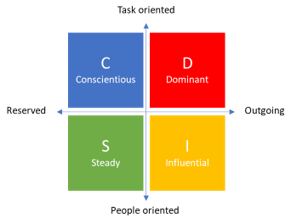 If you are new to the idea of Team Praxis, please read our introduction to the concept before using the table below to improve your communications with team members, stakeholders and anyone else involved in your project, programme or portfolio.
If you are new to the idea of Team Praxis, please read our introduction to the concept before using the table below to improve your communications with team members, stakeholders and anyone else involved in your project, programme or portfolio.
People with different character traits will perceive and deal with complexity in different ways.
 Concientious behaviour would typically propose or want to see: Concientious behaviour would typically propose or want to see:
-
convergent thinking applied to create systematic complexity models that are used consistently; -
the objectification and quantification of the level of complexity to improve decision making; -
monitoring of the level of complexity and processes in place to manage any changes. Someone exhibiting concientious behaviour would typically perceive complexity as: -
something to which logic and structure must be applied in order to understand and predict its impact; -
a threat to a structured and planned way of delivering change requiring action to reduce the uncertainty. |  Dominant behaviour would typically propose or want to see: Dominant behaviour would typically propose or want to see:
-
a simple means of assessing complexity that results in improved decision making; -
clear accountabilities for its definition and control, resulting in reduced risk to delivery; - freedom for those accountable for managing complexity to allow them to take any action they deem necessary.
Someone exhibiting dominant behaviour would typically perceive complexity as: -
increasing the level of risk to delivery - requiring it to be quantified, monitored and controlled; -
a factor that should be simplified, framed and quantitatively controlled. |
 Steady behaviour would typically propose or want to see: Steady behaviour would typically propose or want to see:
-
key individuals engaged in and given the opportunity to input to the governance and management of complexity; -
clearly identified roles and responsibilities across the team to manage complexity and its consequences. Someone exhibiting steady behaviour would typically perceive complexity as: |  Influential behaviour would typically propose or want to see: Influential behaviour would typically propose or want to see:
-
complexity being loosely defined with the focus being on the factors that lead to complexity; -
early discussion within the team and with stakeholders as to the level and type of complexity and for the opportunities it may present; - the application of high level conceptual models to describe complexity.
Someone exhibiting influential behaviour would typically perceive complexity as: |
Thanks to Donnie MacNicol of Team Animation for providing this page.
 If you are new to the idea of Team Praxis, please read our introduction to the concept before using the table below to improve your communications with team members, stakeholders and anyone else involved in your project, programme or portfolio.
If you are new to the idea of Team Praxis, please read our introduction to the concept before using the table below to improve your communications with team members, stakeholders and anyone else involved in your project, programme or portfolio.
 Concientious behaviour would typically propose or want to see:
Concientious behaviour would typically propose or want to see: Dominant behaviour would typically propose or want to see:
Dominant behaviour would typically propose or want to see: Steady behaviour would typically propose or want to see:
Steady behaviour would typically propose or want to see: Influential behaviour would typically propose or want to see:
Influential behaviour would typically propose or want to see:



